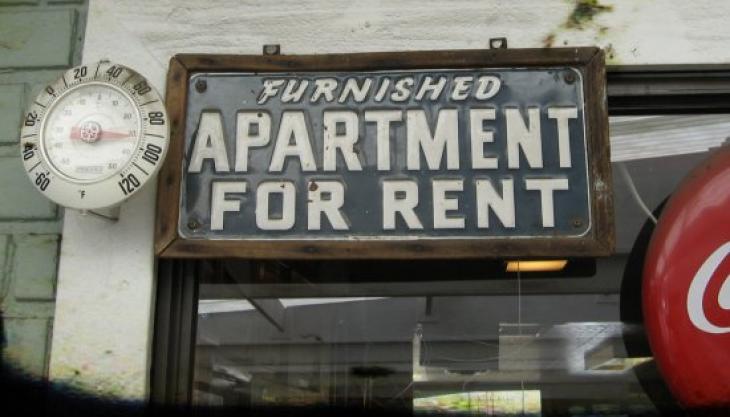Using Chapter 7 Greensboro Bankruptcy to Stop Eviction
Submitted by Rachel R on Wed, 01/03/2018 - 9:01am

How bankruptcy can help with a rental eviction
Image by turkeychik via Flickr
Home is where the heart is, and it represents stability for you and your family. If you’ve been given an eviction notice, it can be very stressful, and you might be wondering where to turn and what to do next. Eviction can be stopped by a bankruptcy filing, at least in the short run, but the outcome depends on whether you’re being evicted from a property you rent or own. With property you own, filing Greensboro bankruptcy can temporarily stop the foreclosure process which is the first step towards eviction from a property you purchased with a mortgage. With rental property, the timeline is faster and certain conditions must be met to gain relief. Here’s what you need to know.
Automatic stay on collections in bankruptcy
When you file for Chapter 7 Greensboro bankruptcy, there is an automatic stay which means that creditors can’t contact you regarding their debt and must stop all attempts at debt collection. The automatic stay remains in place for 90 days. However, this applies differently to real estate. If you've received a foreclosure notice on your home, the 90-day stay will shut this down for three months. If you’re in rental property, you can delay eviction for a month, but only if you plunk down some cash.
Eviction from rental property is a two-step process
The first step is an eviction notice. If you’re behind on your rent, the landlord must give you notice that demands the rent be paid within 10 days. This is known as a “10-day demand for rent.” You might also receive an eviction notice if your lease has ended and you are still in the property. This is called a holdover. With a holdover, you receive a seven-day notice to vacate or 30 days for a mobile home rental.
Once the time from the initial notice lapses, the landlord must file a “Summary Ejectment” case against you in court. The landlord can’t come and throw you out – they must complete this process or else they are breaking North Carolina law. The court issues a Summons, and you’ll be served by the Sheriff with notice of the case against you. You must appear on the court date if you want to defend yourself.
If either party doesn’t show up, the other party wins by default. If the landlord wins the case, he gets a “Judgment of Possession.” You have 10 days to appeal this judgment. If you don’t appeal or lose the appeal, you must vacate the home and take your property. You might be able to fight the eviction if the landlord has accepted some money from you, if you didn’t get timely notice of the hearings, or if you were discriminated against or the eviction is retaliatory.
Eviction for other reasons
Sometimes eviction isn’t related to money. This can occur in instances where the landlord alleges that you have used the property for criminal activity or if they are not following the rules for maintenance, subletting, or are damaging the property.
For this type of eviction, the landlord must file a petition stating the cause for eviction, even though you are current on rent. You can file an objection to the landlord’s claims within 15 days of receiving the landlord’s notice. It’s essential that you show up to the hearing to contest the claims and produce any evidence you might have to defend yourself.
How Greensboro bankruptcy can help
Filing bankruptcy is most effective when you file after the initial complaint is filed with the court by the landlord but before the Judgment to Evict is issued. You will have to pay a deposit of one month’s rent with the court to stay in the property, and it should be paid the same day as you file the Chapter 7 bankruptcy case.
Depending on your plans and ability to relocate, you might be better served by choosing Chapter 13 for your Greensboro bankruptcy because it puts you on a repayment plan to catch up past-due debt. If you’re facing eviction and have other debts piled up like medical bills, maxed out credit cards, and older income taxes, Greensboro bankruptcy may be the solution.
Don’t wait! If you’ve been sent a notice of eviction or foreclosure, contact the Law Offices of John T. Orcutt to discuss your options and how bankruptcy may help. Read reviews from our satisfied clients then call +1-833-627-0115 to schedule a free Greensboro bankruptcy consultation at one of our locations in Raleigh, Durham, Fayetteville, Wilson, Greensboro or Wilmington.
Debts Hurt! Got debt? Need help? Get started below!
Serving All of North Carolina
- Bankruptcy Attorneys Raleigh NC (North)
- Bankruptcy Attorney Fayetteville NC
- Bankruptcy Attorney Durham NC
- Bankruptcy Attorneys Wilson NC
- Bankruptcy Attorneys Greensboro NC
- Bankruptcy Attorneys Southport NC
- Bankruptcy Attorneys Wilmington NC
Bankruptcy Attorneys Raleigh NC (North)
6616 Six Forks Rd #203 Raleigh, NC 27615 North Carolina
Tel: (919) 847-9750

Bankruptcy Attorney Fayetteville NC
2711 Breezewood Ave Fayetteville, NC 28303 North Carolina
Tel: (910) 323-2972

Bankruptcy Attorney Durham NC
1738 Hillandale Rd Suite D Durham, NC 27705 North Carolina
Tel: (919) 286-1695


Bankruptcy Attorneys Greensboro NC
2100 W Cornwallis Dr. STE O Greensboro, NC 27408 North Carolina
Tel: (336) 542-5993

Bankruptcy Attorneys Southport NC
116 N Howe St. Suite A Southport, NC 28461 North Carolina
Tel: (910) 218-8682

Bankruptcy Attorneys Wilmington NC
116 N. Howe Street, Suite A Southport, NC 28461 North Carolina
Tel: (910) 447-2987
